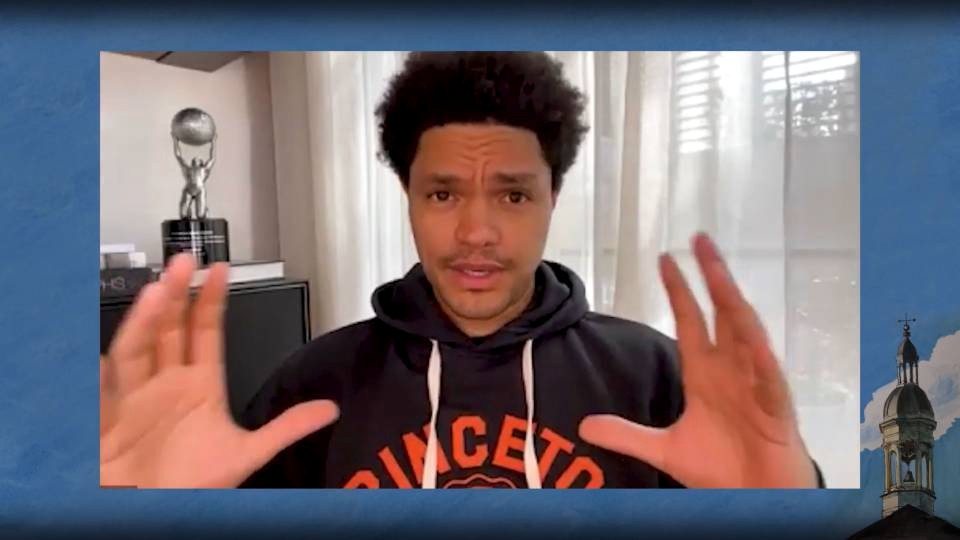By Pam Hersh
My favorite Princeton University graduation event is neither the commencement nor the baccalaureate ceremony, but rather a celebration that is a bit more obscure – and in a class all by itself.
It is Class Day, which features no pomp and circumstance, just a lot of soul.
A tradition that dates to 1856 and takes place the day before Princeton’s Commencement, Class Day is a lighthearted ceremony organized by seniors to recognize the achievements of their class. Over the years, I have stalked the proceedings (located – in my time – on Cannon Green behind Nassau Hall) by standing on the sidelines outside of the roped seating for members of the graduating class. The ceremonies I have seen featured speakers from very diverse backgrounds and professions, but all sharing a talent for evoking laughter, while dispensing memorable and profound advice about life post- Princeton.
This year’s Class Day for the Class of 2021 on May 15 was particularly joyful for me, because I did not have to crane my neck and strain my back or melt in the sun to enjoy the program. It was virtual, and I was able to watch the proceedings with my favorite companion – my Thermos of coffee.
Of course, the members of the Class of 2021 were somewhat less joyful about the virtual presentation, but they really rose to the occasion. They produced a first-rate show filled with jokes, memories, and countless thank yous to university staff who made their campus lives so meaningful and bearable over the past four years. And no one during the entire program asked anyone to unmute.
This year’s Class Day speaker was Trevor Noah, author, comedian and host of The Daily Show (now called The Daily Social Distancing Show) – but he didn’t give a speech, like some of his comedian colleagues, who, in the past have graced the Class Day podium, such as Jerry Seinfeld, Jon Stewart and Stephen Colbert. He answered well-crafted and thoughtful questions posed by Class Day co-chairs Michael Wang, Morgan Smith and Kamya Yadav. And he lived up to the expectations of all his fans by providing wise, compassionate, never paternalistic, humorous, honest, and, of course, inspiring responses.
“Looking forward, what is your greatest hope and your biggest fear for the year that follows?” Wang asked.
“My greatest hope is that we will use this time, which is arguably one of the worst periods the world has been in in recent history, to try and transform how we do things,” said Noah, who in 2018 launched The Trevor Noah Foundation, a youth development initiative that empowers youth with access to high-quality education.
He said the pandemic also brought into sharper focus society’s fault lines that existed before COVID-19 — unemployment, homelessness and starvation. Calling this a kind of “permanent coronavirus,” he said that he hopes everyone will have more compassion for these populations because they confronted one or more of these challenges to some degree.
That coronavirus, particularly in America, “will merely become a blip on the radar,” Noah said. “My fear is that instead of looking at this as a moment in time when humanity itself was tested and people were forced to think together and move together and be together, it will actually be seen as just another point of fragmentation where people can go off in their different directions and believe whatever they want to believe. I fear that many people will learn nothing from this experience.”
As I listened to his words that I wanted to convey immediately to my grandchildren, it occurred to me that the members of the Class of 2021 are particularly fertile ground for his advice. This generation of students has had their lives thus far bookended between two traumatic and transformational events – the attack on Sept. 11, 2001, and the pandemic. When Sept. 11 occurred nearly 20 years ago, the members of the Class of 2021 were babies, whose lives were deeply affected by the changes, paranoia, and prejudices imposed on society because of the horrors of 9/11.
Thinking about this made me appreciate the remarkable accomplishments and composure and (I hate to use that COVID-19 overused word) resilience, demonstrated by the seniors who presented this Class Day program. And I hope they found particular comfort in Trevor Noah’s definition of home.
Yadav, an international student from New Delhi, India, asked Noah, who moved from South Africa to the U.S. to pursue his comedy career, about his definition of home: “How do you navigate ‘belongingness?’ ”
“Home for me is where my people are,” Noah said. “And what I’ve come to learn is my people can be anywhere.” His friends — from his childhood, in the comedy world and other parts of his life — keep him centered. “They remind me of who I am. They make me enjoy life with them.”
Wearing a Princeton University hoodie for the interview, he continued, “If you can find a group of people who you relate to, who make you aspire to be more, who challenge you, who help you enjoy life and help you through the tough times as well, then I think you’ll find a sense of belonging no matter where you are.
Noah had these parting words for the seniors: “I really hope you guys go out and change the world. Don’t let it be the same way it was when you came into it.”
Rather than parting words, I prefer to think of his comments as starting words for not only the members of Princeton’s Class of 2021, but also all of us, who are members of the world.

